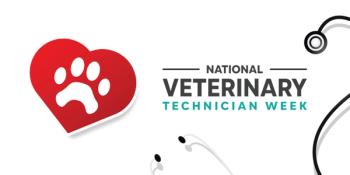
April 1, 2021–Practice manager drops bomb on veterinary hospital team
Earlier today, a powerful stress bomb injured 16 people working at Happy Tails Veterinary Hospital in Reuford, New York.
A bomb rocked the once-thriving Happy Tails Veterinary Hospital in Reuford, New York, this morning, injuring all 16 staff members on the scene as well as several patients. Veterinary technician Carol Bugelmeyer, who was working at the time of the blast, spoke with dvm360®.
“We were all just doing our jobs,” Bugelmeyer said. “Hectic as usual, but we’re used to that. Then our practice manager, Judith Attitudeth, came in and just dropped this enormous stress bomb on us. We were taken completely by surprise.”
Darlene Wooten, a receptionist at the practice, corroborated Bugelmeyer’s account from her living room sofa, where she is recovering this afternoon with an ice pack on her head. Wooten said that this outburst was not a first for Attitudeth.
“She’s out of her mind is what she is,” Wooten said. “She needs help! Everything is going along fine, then something happens to freak her out. It could be anything—someone forgets to clock out, someone forgets to put the bloods in the pickup box, her husband (the owner) freaks out on her—and then she walks in the room and drops this enormous stress bomb on us. It just blows up the whole day.”
Kennel worker Alison Montgomery was also there when the bomb exploded and described the scene. “We were laughing. We were actually having a great time and the day was flowing smoothly,” Montgomery said. “Then out of the blue, Judith walks in and bellows, ‘Are you people deaf! Am I the only one who can hear the phones ringing off the hook?’”
Wooten confirmed Montgomery's account. “Of course we had heard the phones ringing off the hook, but they’ve been ringing off the hook since last March, so frankly no one noticed,” she said. “Dr. Abercroff said as much and then Jude—or ‘Tude as we call her—really blew.”
Wooten continued: “‘Didn’t hear them? Didn’t hear them?! It sounds like the GD bells of Saint Mary’s out there!’ Judith shouted. ‘You people need to understand something and understand it good. Those phones equal paychecks. When those phones ring, that’s my money trying to get in the door and when you people choose to sit back here and screw around instead of helping out with the phones, then I’m not getting paid and that means you’re not getting paid. Capiche?!’ It was really scary.”
Wooten added, “We all know she’s nuts. We figured that out years ago. We’ve even forgiven her, because when she’s normal Judith can be actually pretty cool. But man, when she drops her stress bombs, forget it. It’s the reason why morale is often so low and why we can’t hold onto team members.”
Practice advisor Bash Halow, CVPM, LVT, who was brought in to assess the damage and help with cleanup, said this is not the first time he’s been called to such a scene. “I’m not going to sugar coat it. It was bad,” he said. “Unfortunately, I’ve seen worse.”
According to Halow, stress bombs are probably one of the biggest threats to veterinary practice teams. You have these people, usually the owner or manager, but it can be anyone really, they are like that villain Bomb Voyage in the Disney/Pixar movie The Incredibles. They just drop these stress bombs everywhere they go. These people can be sweet as pie when they’re not agitated, but get them hopped up about something and the only way they feel they can shed their anxiety is to blow it out on the others around them. Ironically, it has the opposite effect. It’s the equivalent of having a leg that hurts and in order to describe the pain to others, you kick them in the leg. No one feels better in the end. Everyone’s leg hurts.”
Happy April Fool’s everybody!
Although the above story is an April Fool’s gag, stress bombers are all too real. To learn more about the damage stress bombs can inflict—and how to prevent them from exploding in the first place—Halow will share his insight and experience at upcoming Fetch dvm360 conferences this year.
Newsletter
From exam room tips to practice management insights, get trusted veterinary news delivered straight to your inbox—subscribe to dvm360.






